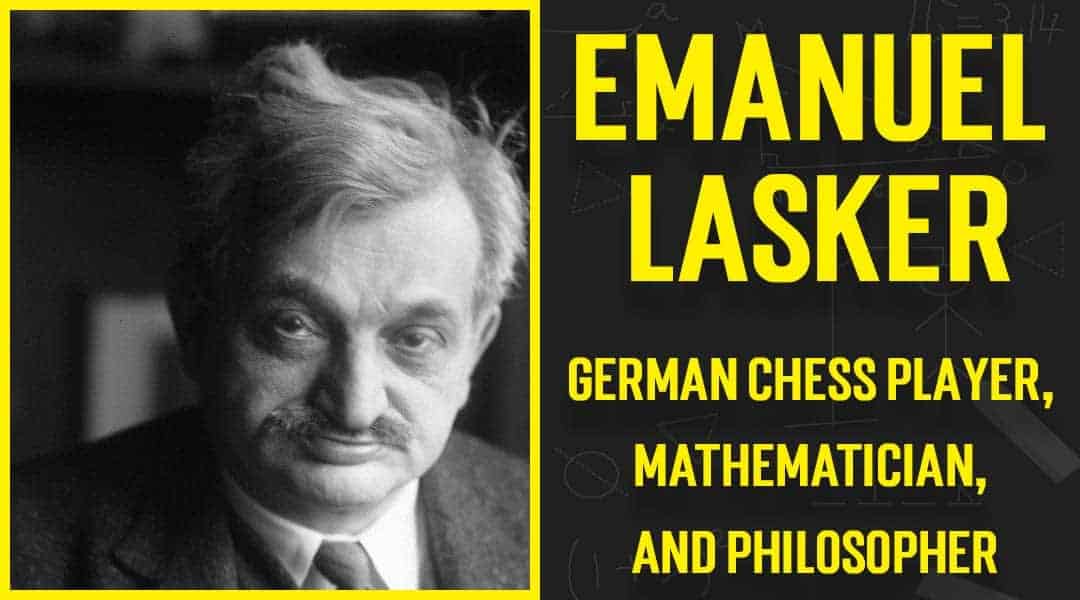Emanuel Lasker (1868-1941)
Emanuel Lasker was a German mathematician and philosopher. He was a Chess player too. Lasker was one of the greatest Chess players ever and a world champion for 27 straight years reigned between 1894 to 1921.
Emanuel was not just a good player but he also made a significant contribution to the development of games. As a mathematician, Lasker is known for his contribution to commutative algebra.
Time and Place of Birth
Emanuel Lasker was born on the 24th of December in 1868 at Berlinchen, Neumark, Prussia (which is now a part of Poland).
Life History
Emanuel Lasker was born in the family of a Jewish Cantor. His father’s name was Adolf Lasker who was a cantor of Synagogue.
Lasker’s mother was Rosalie Isrealssohn. Lasker went to Berlin for studies at the age of eleven. In Berlin, he lived with his older brother Berthold who was among the top ten Chess players of the world at that time.
Emanuel learned chess from his brother. After this, he gave most of his time to chess which bothered his parents about his studies and they decided to change his school.
However, his new school also had a chess connection. From here he began his chess career. In 1911 he married Martha Cohn. Like other Jews, at that time he had to leave his country.
Lasker went to England in 1933 and lived there until 1935. In 1937 he moved to the USA. There his wife Martha fell ill and died later that year. In 1939 Laskar became dizzy while giving a lecture. This was the start of his illness or countdown to death.
Death
He died on 11 January 1941 in New York city of the United States of America.
Must Read These Also.
- Johannes Kepler was a German astronomer, mathematician, and astrologer.
- Friedrich Ludwig Gottlob Frege was a German philosopher, logician, and mathematician.
Career as a player
Lasker won his first title at Breslau in 1888/89 Cafe Kaiserhof’s annual winter tournament. He won two tournaments in London in 1892.
Lasker won his first world championship in 1894 against Wilhelm Steinitz. After this, he remained world champion for the next 27 years. It is the longest reign as world champion in chess. Lasker won again in the world championship against Steinitz in 1896.
In 1904 he was challenged by Frank Marshall during his tour of the USA. In 1907 Lasker returned to Germany and was again challenged by Marshall for the championship. Emanuel lost his world championship to Jose Raul Capablanca in 1921.
However, he wanted to resign from his championship before this but then he changed his mind and lost his title in Havana.
Contribution in Mathematics
Emanuel Lasker is known for his work on commutative algebra. In this, he introduced the theory of the primary components of ideals.
This influenced the theory of Noetherian Rings, after which Rings having primary decomposition Properties are called Laskerian Rings. Lasker also worked on the Mathematical analysis of card games.
Must Read These Also.
Books by Emanuel Lasker
- Lasker’s manual of chess
- Common sense in chess
- Struggle
- The international chess congress, St. Petersburg, 1909
- Lasker’s how to play chess
- Lasker’s chess primer
- Die philosophie des unvollendbar
- Lasker’s chess magazine

Quotes by Emanuel Lasker
When you see a good move, look for a better one.
The hardest game to win is a won game.
Without error, there can be no brilliance.
Chess is above all a fight.
Must Read These Also.
- Georg Ferdinand Ludwig Philipp Cantor was a German mathematician
- Georg Friedrich Bernhard Riemann was a German mathematician
FAQ
How long was Emanuel Lasker’s world champion?
Lasker was a world champion for 27 consecutive years from 1894 to 1921.
Who defeated Lasker?
Jose Raul Capablanca
Where is Emanuel Lasker buried?
Beth Olom Cemetery, Ridgewood, Queens country, New York.
When did Lasker lose his world title?
28 April 1921
What was the IQ of Emanuel Lasker?
165
See also
Emanuel Lasker was a great chess player but with this, he was a mathematician too. Germany and mathematicians is like a love story made in heaven because this country gave so many great mathematicians to this world like David Hilbert, Carl Friedrich Gauss, Georg Cantor, Einstein, Grothendieck, and Riemann, etc.


